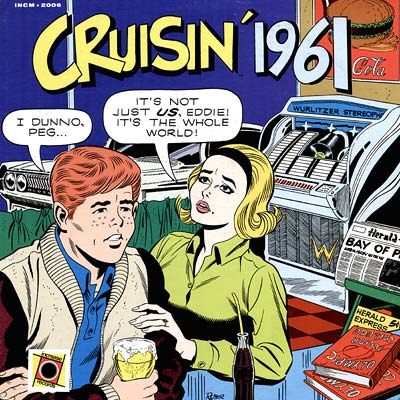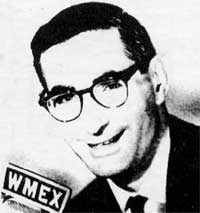By Pete Johnson
The year is 1961 and CRUISIN’ presents radio, just as it was then. Like the other volumes of the CRUISIN’ series, this record consists of hit songs, radio commercials, jingles, disc jockey chatter and other audio memorabilia from the year. Our host for ’61 is Boston’s own Arnie “Woo Woo” Ginsburg, the city’s number-one disc jockey from 1956 to 1967. Arnie’s WMEX show was called Night Train and, through a curious chain of associations with the sound of trains going “Woo Woo” in the night, Mr. Ginsburg gained his nickname.He was virtually a household word in the New England area thanks to a promotion by the Adventure Car Hop which offered two-for-one specials to any customer who mentioned “Woo Woo” Ginsburg. Adventure also named a special dish after him, the Ginsburger. Arnie’s Friday night record hops at the giant Surf Ballroom in Nantasket Beach were a year-round Picture of Arnie Ginsburg
Arnie “Woo Woo” Ginsburgtradition for a decade and every name artist and group eventually played there with Arnie. He was on the air continuously for twelve years and his youthful following was fantastic in its devotion, possibly because he transformed adolescent insecurities into a triumph. His voice  a continual teenage crack  combined with the constant clatter of kazoo, cowbell, buzzer, bermuda bell, car horn, oogah and train whistle, epitomized the noisy awkwardness of teenagery, but Arnie managed to bring it all off with humorous grace.
A glance at the titles from this volume of the CRUISIN’ series will confirm that 1961 was a musically nondescript year. There were, as there are in any year, some outstanding rock and roll records, but there were no exciting trends; there was no sense of growth. In some ways, the musical doldrums of the year could be credited to the aftermath of the Payola hearings of 1959 and 1960. Some of radio’s most influential and colorful figures had their wings singed by the Washington investigation. The exposure of their loss of real or imagined innocence turned things grey for a while.
Inevitably, with the erosion of the power of some of radio’s key rock and roll figures, Top 40 radio was on the rise. With its limited number of playable records, chosen on a relatively conservative basis, and its de-emphasis of the radio personality, Top 40 programming tended to homogenize popular music. 1961 was one of the most homogenized years.
Historically, it was also a bland time. Despite the dynamism which John F. Kennedy projected from the White House, the tide of human affairs seemed to be running against the United States. We severed diplomatic relations with Cuba and shortly afterwards fell on our faces in the Bay of Pigs. The East Germans constructed a wall between East and West Berlin, creating fears of war. Yuri Gagarin, a Russian cosmonaut, became the first man to orbit the earth.
From the vantage point of 1961, it seemed as if the country were doomed to normalcy. Russia remained the huge vague threat she always seemed to be. Political activism was at a low ebb on campuses. Joe College didn’t listen to rock and roll. That was for high school. He also didn’t grow his hair long. That was for Beatniks. College was an ivory tower with few ties to the surrounding terrain. Surfing was becoming a huge youth cult on the West Coast and it had become identified with a simple brand of twangy guitar music, but no one had yet thought to set words to it.
A lot of musical  and attendant social  excitement had happened in the Fifties and there was a lot to come in the Sixties, but the early part of this new decade was its least exciting portion. Rock and roll seemed to be settling into a paunchy middle age and it was fitting that, as Billboard (the music trade magazine) reported in March of 1961, Chuck Berry had closed his St. Louis night club and was opening a 30-acre amusement park in Wentville, Mo. Thus did one of the founding fathers of rock and roll join the landed gentry. On January 15, 1961, Chuck Berry was 30 years old.
 Pete Johnson
The original Cruisin series was conceived and produced by Ron Jacobs. The “airchecks” on CRUISIN’ were not actual broadcasts, rather, they were masterful re-creations featuring legendary air talent.
Our thanks to RJ for making this classic material available to REELRADIO.


